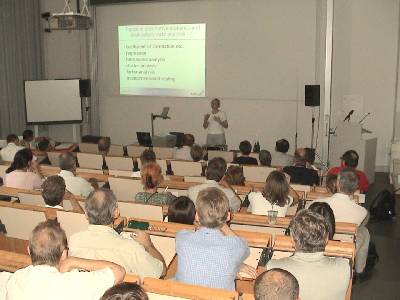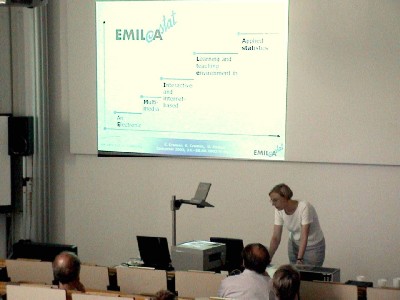Introduction
Within the "New Media in Education Funding Programme" the German Federal Ministry of Education and Research (bmb+f) supports the project "e-stat" to develop and to provide a multimedia web-based and interactive learning and teaching environment in applied statistics called EMILeA-stat.
The EMILeA-stat group is organized in several teams located at seven German universities with about 70 people involved. It is supported by further partners in advice and evaluation and cooperates with economic partners such as SPSS Software, BertelsmannSpringer Science+Business Media (Springer Verlag), and MD*Tech Method & Data Technologies (XploRe-Software).
The aims
Statistical and quantitative thinking and acting have become fundamental skills in several branches of natural sciences, life sciences, social sciences, economics, and engineering. Models, tools, and methods, which have been developed in statistics, are applied in modelling and data analysis, e.g., in business and industry, in order to obtain decision criteria and to gain more insight into structural correlations.
Owing to these various applications and the necessity of using statistical methodology there have to be consequences with respect to learning and teaching. The organization of teaching processes has to be changed: For example, pupils should get to know elementary and application-oriented statistics which requires that statistics and data analysis, theoretically and practically, have to become part of teachers' studies at the universities and at in-service training courses. Moreover, students of many different disciplines with a statistics impact should be familiar with basic and advanced statistics. These goals may be achieved by working with EMILeA-stat. Being an essential part of statistical education it may be applied in schools, universities, and in further vocational training. But also supervised and self-directed learning will be possible because of a basic concept, which offers the opportunity to tailor individual courses which cover specific learning needs. EMILeA-stat supports teaching in different manners and can hence be seen as an innovative high-quality contribution to the learning facilities of the present and the future. Statistics-modules, views, and scenarios will be well suited to each other and complexly linked. The presentation of the material takes in account that different types of users have different needs, such that EMILeA-stat may be used in teaching, selective support of teaching as well as web-based learning. By this it is possible to address and to reach pupils, students, and working persons in the fields of bio and life sciences, computer science, engineering mathematics, psychology, statistics, different areas of economics, and social sciences with just one system. Moreover, EMILeA-stat serves as a kind of information-forum in "everyday-statistics" and offers the opportunity for the everyday use as an intelligent statistical encyclopedia.
The system
EMILeA-stat is being developed as a user-oriented product with an open source concept. The chosen architecture is also open to guarantee the efficient applicability and practical adaptation to respective needs of teaching as well as learning. It will be possible - and the present teams particularly desire it - to incorporate user-specific views and scenarios. Hence, people teaching statistics are invited to contribute statistical content in a broader sense.
It is planned that non-commercial education will be free of charge and freely accessible via Internet.
The following topics will be contained in EMILeA-stat: descriptive and inductive statistics, explorative data analysis, interactive statistics, graphical representations and methods, probability theory, statistical methods in finance and insurance mathematics, modelling and prediction of data in financial markets, statistical methods in marketing, scenarios stock-market, productions and virtual company, experimental design, statistical quality management, business games, statistical methods in controlling, statistical ecology.
In this talk the structure of EMILeA-stat, its scope and objectives, and several examples are presented including particular applications, texts, views, graphics, and interactive applets.
Contact:
Dipl.-Math. Katharina Cramer (Project Coordinator)
Prof. Dr. Udo Kamps (Project Leader)
University of Oldenburg, Department of Mathematics, 26111 Oldenburg, Germany, e-stat@uni-oldenburg.de, www.emilea.de.
Keywords:
Applied statistics, web-based, interactive, teaching environment, learning environment.

